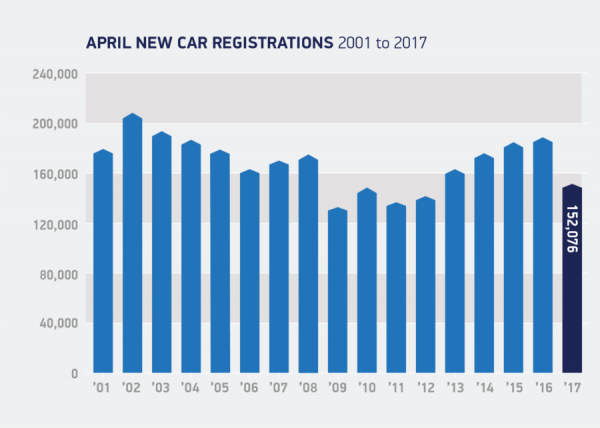New car demand drops as updated vehicle excise duty rules come into force
April sales down 20 per cent on last year, but year-to-date figures are still impressive

New car registrations fell 19.8 per cent in April following changes to the way vehicle Excise Duty is calculated.
Figures released by the Society of Motor Manufacturers and Traders (SMMT) show registrations fell to 152,076, compared with 189,505 in April last year.
The downturn follows an impressive March, which saw the best month since records began, with 582,337 new cars registered.

Last month’s high figures and this month’s downturn are both being put down to changes in the way vehicle excise duty is calculated, as buyers scrambled to register their new cars before fees for many cars increased.
The new rules, introduced on April 1, see only zero-emission cars paying no tax. Previously, all cars that emitted less than 100g/km of CO2 paid nothing. The new rules only apply to cars registered after the rule change was implemented.
It resulted in the first downturn for alternatively-fueled vehicles in almost four years, though it was marginal at 1.3 per cent. It’s in part because plug-in hybrid vehicles are among the hardest hit by rule changes – most were free to tax before the changes but are now eligible for the flat yearly rate of £140.
Mike Hawes, SMMT chief executive, said: “With the rush to register new cars and avoid VED tax rises before the end of March, as well as fewer selling days due to the later Easter, April was always going to be much slower.
“It’s important to note that the market remains at record levels as customers still see many benefits in purchasing a new car. We therefore expect demand to stabilise over the year as the turbulence created by these tax changes decreases.”
Despite the weak April figures, year-to-date registrations are at the highest level on record at 972,092, showing a 1.1 per cent increase on 2016’s figures.

Ian Gilmartin, head of retail and wholesale at Barclays, said: As the year to date numbers are still up compared to 2016, with nearly a million cars registered already, April’s data shouldn’t cause undue concern.
“The message sellers should take is to be on their guard and monitor sales patterns over the next quarter, but also recognise the unique circumstances that contributed to the weaker result.”





